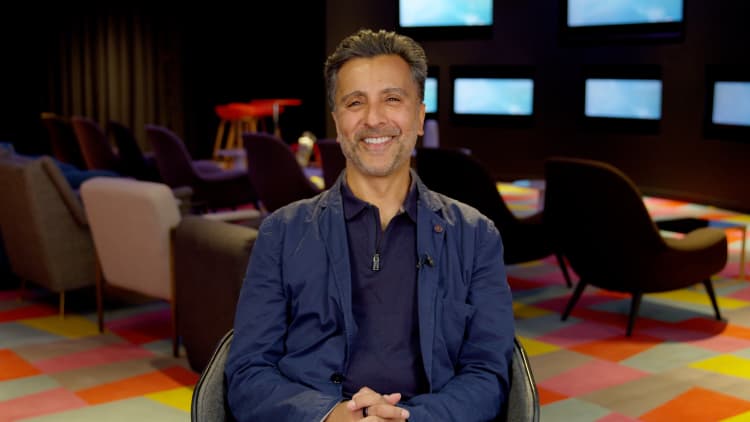It is most noticeable to therapists of color that, since the start of the pandemic, their peers are leaving the profession in droves.
The need for more mental health services during the Covid-19 pandemic — and in its aftermath — has increased the responsibilities of therapists.
And that may be why many of them, especially therapists of color, are quitting, says Lisa Savage, a licensed clinical social worker with a practice in Delaware.
"It's led to a burnout of a lot of us because the guilt of wanting to meet the needs, but just not being able to, is a struggle," says Savage. "Balancing our own personal needs with the needs of our communities has just brought some to the breaking point."
Prior to the pandemic, Savage used to see seven or eight clients a week but has since scaled back to five a week, at most. "There are days when, if I see more than two clients, I am spent," she tells CNBC Make It.
In an already marginalized field, people of color have always been the minority: between 2015 and 2019, about 71% of marriage and family therapists and 64% of social workers in America were white.
On the flip side, here are the numbers for BIPOC therapists and social workers during the same timeframe, according to data provided by the Fitzhugh Mullan Institute for Health Workforce Equity at the George Washington University.
Marriage and Family Therapists
- Asian/Pacific Islander - 3.7%
- Hispanic - 9.96%
- Black - 12%
Social Workers
- Asian/Pacific Islander - 3.4%
- Hispanic - 10.6%
- Black - 19.75%
- Native American - 0.5%
Though there isn't any recent data to reflect the 2022 numbers, BIPOC experts have noticed their fellow therapists quitting and are feeling the effects.
The skyrocketing demand for therapists of color
Traumatic events like the death of George Floyd and the increase in hate crimes targeting the Asian community in 2020, propelled the demand for mental health resources for BIPOC individuals.
And most patients of color feel more comfortable with therapists from their racial or ethnic backgrounds.
"I had always lived with this value that we would never have a waitlist," she says. "However, last year, we had a waitlist because the demand was just overwhelming. And again, remember I have 75 therapists that work at my practice."
BIPOC patients seek therapists of color for a multitude of reasons, including the want to avoid:
- Hurdles of educating their provider about their culture
- Code-switching
- Subtle hints of racism/microaggressions
When she became aware of the increasing demand for mental health services in BIPOC communities, Savage co-founded Clinicians of Color, an online directory that makes it easier for patients of color to find mental health professionals.
Her practice also has a clinical training program, intentionally focused on bringing in people from BIPOC communities and provides extensive training, supervision and the ability to see clients.
"In my experience, a lot of white providers will call themselves culturally competent, and I always challenge that because you cannot become competent in somebody else's culture," says Savage.
"You can be respectful of a culture, humble and curious about a culture, but you cannot be culturally competent."
But the pressing need for therapists of color is only amplified by the systemic issues that prevent them from breaking into the field in the first place, according to Helen Park, a licensed clinical social worker and supervisor of Social Work and Diversity Program, Fellow at Ackerman Institute for the Family.
To become a licensed clinical social worker — a title required to become a practicing therapist in most states — aspiring therapists must pass the Association of Social Work Boards (ASWB) exam.
Pass rate data for first-time test takers from 2018 to 2021 show that white examinees have the highest chance of passing the ASWB clinical exam, with over 80% receiving their license after testing, according to a report by the Association of Social Work Boards.
Here's what the pass rates were for other racial/ethnic groups.
- Multiracial: women: 80%, men: 77%
- Asian: women: 72%, men: 66%
- Hispanic/Latino: women: 65%, men: 61%
- Native American/Indigenous: women: 64%, men: 57%
- Black/African American: women: 45%, men: 37%
"We know that standardized tests are biased. So, do the test developers need more input from BIPOC mental health providers? I would say absolutely, yes," Savage says. "Because sometimes the questions are written in such a way that they're really not culturally appropriate."
The cost of post-graduate training opportunities, including preparation to help professionals become licensed, is also a hurdle for aspiring BIPOC therapists and should be more sustainable than what it is, Park notes.
And more training and mentorship programs, specifically geared towards therapists of color, are needed to promote professional development and elevation in the industry.
Practices can also prevent additional barriers for aspiring therapists of color by seeking out talented BIPOC therapists to hire and making salaries more justifiable, Park adds. "If you want to bring in therapists of color, it's on you to do the work."
Sign up now: Get smarter about your money and career with our weekly newsletter
Don't miss:



